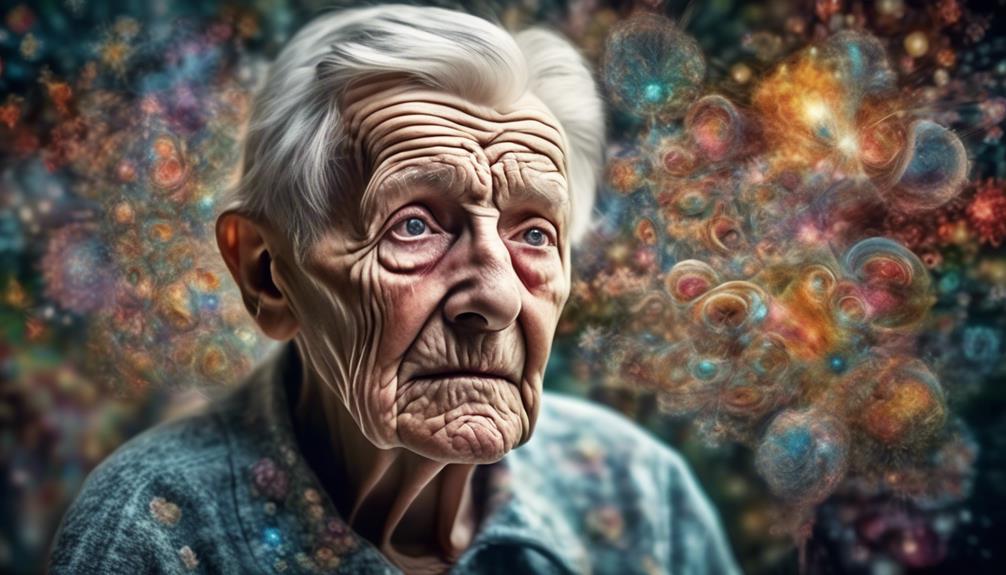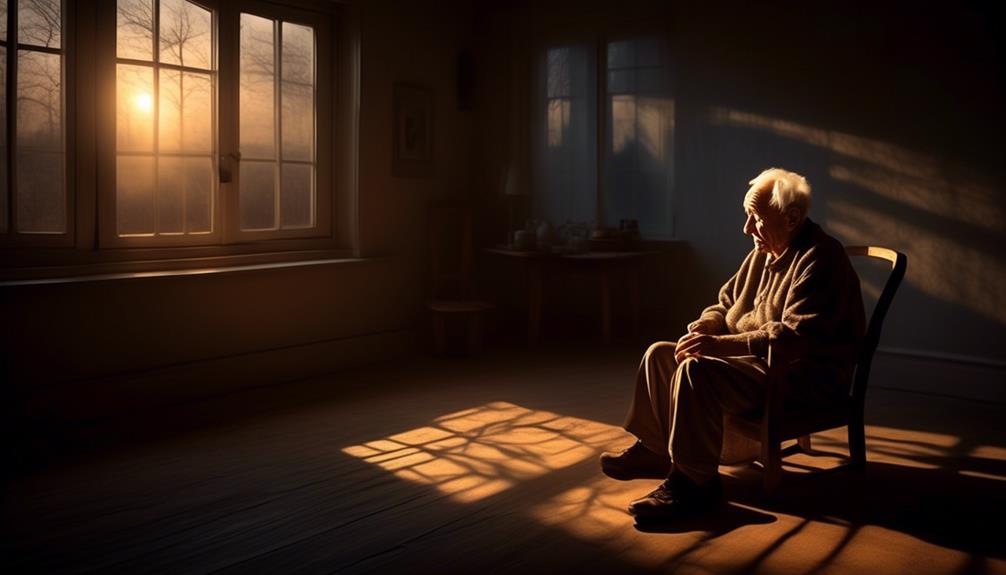Picture yourself traveling through dense fog, where the usual landmarks take on new and strange forms, and shadows whimsically move around in the mist.
In the realm of dementia, hallucinations can cast a similar veil over one's reality, where perceptions twist and bend, creating a world that merges the real with the imagined.
However, beyond the surface of these illusions lies a deeper exploration into the complexities of the mind and the experiences of those living with dementia.
Key Takeaways
- Hallucinations are prevalent in individuals with dementia, ranging from 4% to 76%.
- Visual hallucinations are the most common type experienced by people with dementia.
- Altered sensory processing, brain damage, and medication side effects contribute to hallucinations.
- Caregivers should prioritize understanding, reassurance, and modifying the environment to support individuals.
Prevalence of Hallucinations in Dementia
Hallucinations in dementia are prevalent, with a wide range of occurrences from 4% to 76% in individuals diagnosed with Alzheimer's disease. These false perceptions can manifest as seeing or hearing things that aren't present in reality.
Visual hallucinations, such as objects or events involving the senses, are the most common type experienced by people with dementia. These events involving the senses can vary from simple occurrences like flashing lights to more complex scenarios of seeing people and animals that aren't there.
As dementia progresses, it causes damage to the brain regions responsible for processing sensory information, leading to an increased likelihood of experiencing hallucinations. Notably, hallucinations are also prevalent in other forms of dementia like Lewy body dementia and Parkinson's disease dementia.
When hallucinations become symptomatic in a person with dementia, it's crucial to seek medical evaluation to understand the underlying causes and provide appropriate care and support.
Causes of Hallucinations in Dementia

Dementia-related hallucinations stem from a complex interplay of various factors. One of these is altered sensory processing, which occurs due to progressive brain damage in dementia. This damage affects the way sensory information is perceived, leading to misinterpretations and hallucinations.
Inflammatory and infectious diseases also contribute to hallucinations in individuals with dementia. These conditions cause inflammation in the brain, which disrupts neural pathways and further contributes to the development of hallucinations.
Medication side effects can also trigger hallucinations in individuals with dementia. Some medications prescribed for dementia-related symptoms or comorbidities have the potential to induce hallucinations as a side effect.
Visual impairment is another factor that can lead to hallucinations in individuals with dementia. Failing eyesight, which is common in older adults with dementia, can result in misinterpretations of visual stimuli, leading to the experience of hallucinations.
Lastly, changes in brain chemistry and neurotransmitter levels due to dementia can also play a role in the development of hallucinations. This neurotransmitter imbalance further contributes to the complexity of dementia-related hallucinations.
Caregiver Support for Hallucinations
Considering the intricate challenges posed by the underlying causes of hallucinations in dementia, it's essential for caregivers to adopt a supportive approach that prioritizes understanding and comfort for individuals experiencing these phenomena.
When a person with Alzheimer's or dementia begins to hallucinate, it can be distressing for both the individual and the caregiver. The Institute on Aging suggests that caregivers first assess whether the hallucinations are causing distress or pose any danger to the person. Reacting calmly and providing reassurance can help alleviate any fear or anxiety the person may be experiencing.
Rather than arguing about the hallucination, it's beneficial to offer distractions or engage in activities together to shift focus. Acknowledging the person's feelings behind the hallucination and modifying the environment to reduce sensory triggers are also recommended approaches.
Seeking support from the caregiver community can provide additional strategies and comfort to both the person experiencing hallucinations and the caregiver. With these supportive measures, caregivers can help navigate the challenges of hallucinations or delusions in individuals with dementia.
Managing Hallucinations in Dementia

When managing hallucinations in individuals with dementia, caregivers should first assess the level of distress or danger caused by the hallucination to determine the appropriate course of action. React calmly and provide reassurance and comfort if the hallucination is upsetting. Avoid arguing or trying to convince the person that the hallucination isn't real. Use distractions and engaging activities to shift the person's focus away from the hallucination. Modify the environment by reducing sensory triggers and creating a calm and familiar space.
Hallucinations in dementia, especially in people with Alzheimer's disease, can be frightening experiences. It's crucial to respond with empathy and understanding to support the person experiencing these visions of people or sounds that others can't perceive. By following these strategies, caregivers can help manage hallucinations effectively and create a safe and comforting environment for individuals with dementia.
Resources for Families of Those With Hallucinations
Families of individuals experiencing hallucinations in dementia can benefit from accessing various support resources to assist them in managing and understanding their loved one's condition.
When a person with dementia hallucinates, it can be distressing for both the individual and their family members. Seeking support from understanding family members, friends, professionals, or support groups can provide a safe space to share experiences and learn coping strategies.
Utilizing support services, education programs, and carer support groups can offer practical ideas for handling hallucinations in a compassionate and informed manner.
It is crucial to contact the Dementia Behaviour Management Advisory Service for assistance with behavior changes and consult with the person's physician to review medications and schedule hearing and vision tests.
Additionally, reaching out to the NIA ADEAR Center at 800-438-4380 or adear@nia.nih.gov can provide more information about hallucinations, delusions, and paranoia in Alzheimer's, offering valuable insights for families dealing with accusing behaviors towards others.
Frequently Asked Questions
What Stage in Dementia Is Hallucinations?
Hallucinations can occur in various stages of dementia, including early, middle, and late stages. They're more common in certain types of dementia, such as Lewy body dementia and Parkinson's disease dementia.
The presence and frequency of hallucinations can fluctuate throughout the progression of the disease. Understanding the stage of dementia can help caregivers anticipate and manage hallucinations effectively.
Do People With Dementia Make up Stories?
We find that individuals with dementia may indeed create narratives that differ from reality. These stories often stem from their confusion and memory issues. It's crucial to approach these situations with compassion and understanding, recognizing that their tales aren't intentional falsehoods but rather a product of their condition.
What Do People With Dementia Think About?
When considering what people with dementia think about, it's important to recognize that their cognitive processes may be impacted by the condition. Their thoughts can vary greatly depending on the stage of dementia and individual experiences.
Understanding their perspective and providing support tailored to their needs is crucial. Caregivers play a vital role in assisting individuals with dementia to navigate their thoughts and emotions with patience and empathy.
Is It Better to Go Along With Dementia Delusions?
When faced with dementia delusions, it can be beneficial to validate the person's reality to maintain their sense of dignity and reduce distress. By acknowledging their experiences without directly contradicting them, we can enhance their feelings of security and trust.
Implementing strategies to redirect their focus and create a calming environment can help manage challenging situations effectively. This approach fosters a supportive and compassionate connection, promoting overall well-being for individuals with dementia.
Conclusion
In conclusion, hallucinations are a common symptom experienced by people with dementia. Studies have shown that up to 40% of individuals may experience them at some point.
It's crucial for caregivers to understand the causes of hallucinations. This understanding can help them provide the necessary support and learn effective management strategies.
By seeking medical evaluation and implementing proper care techniques, we can improve the quality of life for those living with dementia and hallucinations.









